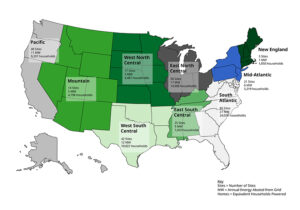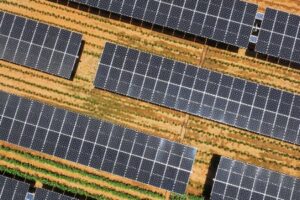How Can Nutritional Changes Affect Earth’s Energy Sources?

Changes in our diets could affect the Earth’s energy sources. As the world’s population continues to grow, surpassing 9 billion people by 2050, there will be an increasing need for fuel to power this growth.
The question becomes how can these needs be met if we are relying on agriculture that is heating the planet and exhausting precious resources like fresh water. One solution may be to dramatically change what we eat.
Increased Sustainability
What we eat matters. Meat takes about 10 times more energy to produce than an equivalent amount of plant food. In addition, when livestock is raised it emits methane – a dangerous greenhouse gas that contributes to global warming. The Food and Agriculture Organization has estimated that one-sixth of the total release of greenhouse gases into the atmosphere is caused by livestock. The sustainability experts at Whole People offer info on how you can change your lifestyle choices to increase sustainability.
On the other hand, if people replaced one-third of their meat intake with plant foods, it would cut emissions of methane and reduce the need for grazing land by 50 percent. Since about two-thirds of our agricultural lands are currently devoted to raising animals for food, significant changes in dietary habits could have a major impact on how we use agricultural land while addressing energy needs around the world.
Nutritional Needs Abroad
There may be further advantages to changing eating patterns. Changing what we eat can also address malnutrition issues in developing countries where people either don’t produce enough food or lack access to adequate nutrition.
Replacing foods lacking in nutrients such as fruits and vegetables with animal products will only exacerbate these health problems while not addressing the underlying causes of malnutrition. In fact, there have been studies in India and Africa that show providing children with nutrient-rich foods such as soybeans results in greater height, improved bone health, and even higher IQ scores.
In contrast, when traditional animal-based diets were replaced with more meat and milk-rich meals, young girls suffered from anemia at a rate four times higher than before the diet change. This is largely related to reduced iron intake caused by less consumption of beans and leafy green vegetables where iron is most highly absorbed in the body.
Organic Farming
For many, the idea of a dietary change is not appealing. The problems associated with industrial farming would need to be addressed as well if we are to produce more food without exacerbating energy use and pollution levels. Organic farming practices, though requiring more land and water resources, result in less soil erosion, improved ecosystem health, reduced greenhouse gas emissions, and decreased fossil fuel use for transportation due to lower yields per acre. In addition, organic soils have been shown to hold on average 50 percent more carbon that can then be sequestered into the ground rather than adding further greenhouse gases into the atmosphere.
Going Vegan
People should also be aware of the effects of meat on their health. Meat has been known to increase the chances of developing certain types of cancer, heart disease, obesity, and diabetes. Fish has been shown to have more benefits than beef or pork so it is better to switch meats. Nutritional changes can affect the emission of greenhouse gases by reducing the amount that people are sick. For some, the idea of a dietary change is exactly what they want to do.
Vegans choose not to eat any animal products for one or more reasons such as ethics, environmentalism, and health. In a study published in Climate Change, researchers compared a vegan diet with those containing meat from livestock. They found that greenhouse gas emissions from the vegan diet were cut nearly in half largely resulting from less land use and changes in agricultural practices. In addition, switching to plant-based diets would reduce the heart disease risk associated with eating red meats as well as reduce incidences of cancers coming from increased fat and cholesterol intake through animal products.
Future Solutions
In order for these changes to take place, there will likely need to be some incentive provided by our industry businesses. Until people begin to demand dietary changes, businesses will be reluctant to implement them. Some companies have actually responded by producing nutritionally enhanced foods in the form of fortified cereals and soy milk.
Other initiatives are being pursued in Africa where dairy farmers are being trained in organic farming methods that result in improved soil fertility, crop productivity, income generation, and animal welfare. It may take time for people to adjust to these dietary changes but when considering the needs of the future it may provide a solution that will keep everyone healthy while also benefiting our environment. As our population continues to rise many challenges will need to be addressed and we must remember there is more than one way we can meet each challenge we face.
Decreased Global Warming Emissions
With the effects of global warming, we should start to take into account our diet and how we can cut back on emissions by changing it. It may seem like a small change but there are drastic changes that can come from it. Switching out certain foods like beef and pork for fish and vegetables could make a huge difference. It takes 23 pounds of grain to produce 1 pound of beef so the less beef we eat, the more grain we have available to feed people.

Healthy food can help us reduce pollution on the planet, image source: unsplash.com
Not only would this help global warming but it would increase food production as well. Nutritional changes affect global warming emissions by cutting back on the amount of methane gas that gets released into the atmosphere. We should also take into account how much water is used to produce certain foods like beef which takes 2500 gallons of water per pound produced.
The less water we use, the more productive it can be for other reasons like cleaning up pollution in the ocean. Nutritional changes also affect global warming emissions by cutting back on how much water we use.
So what can be done? Global agricultural practices will need to dramatically change if we are going to feed future generations healthy food while reducing our impact on the environment. How changes might be implemented is a complicated discussion, but the consequences of not doing so are equally grave. A new way to produce food may be one of the most important adaptive strategies we have for dealing with a changing planet.






